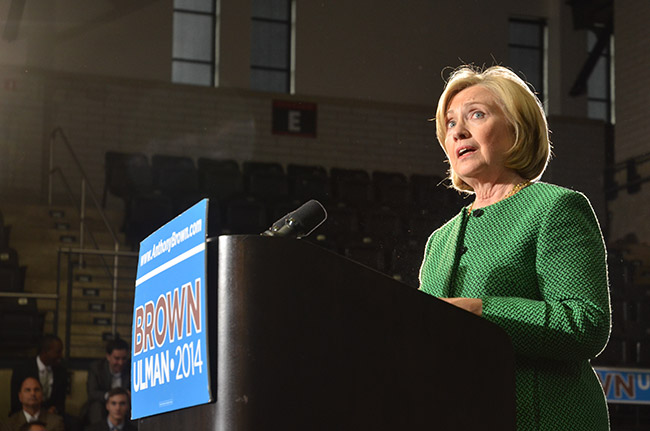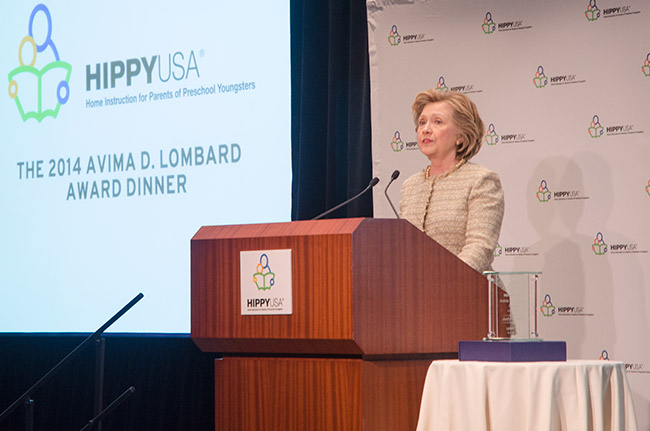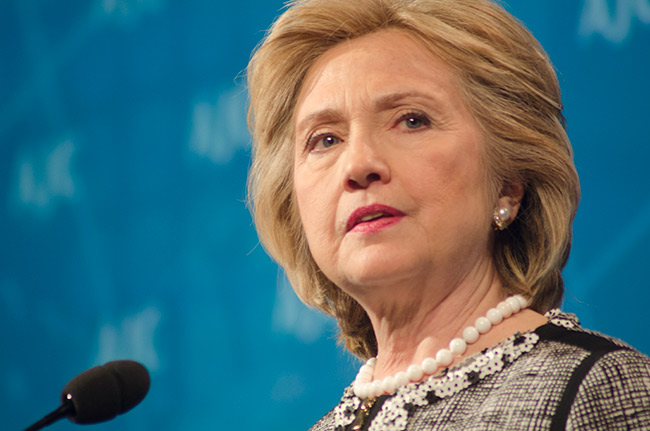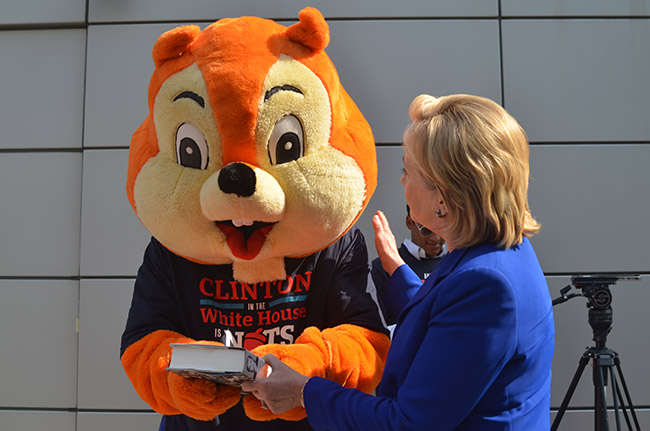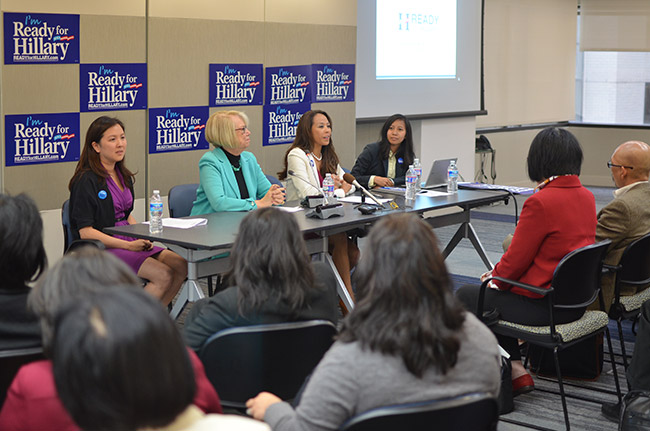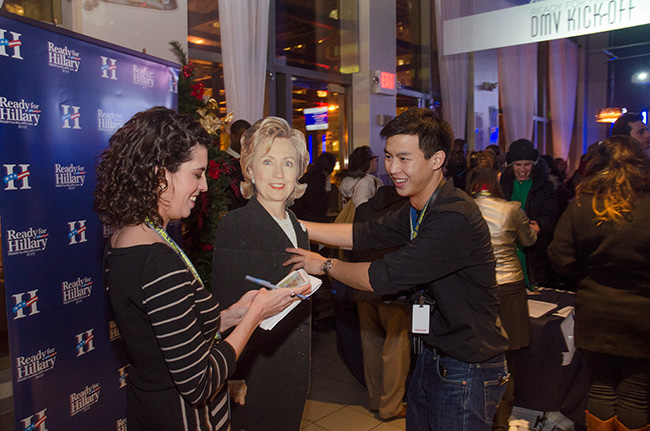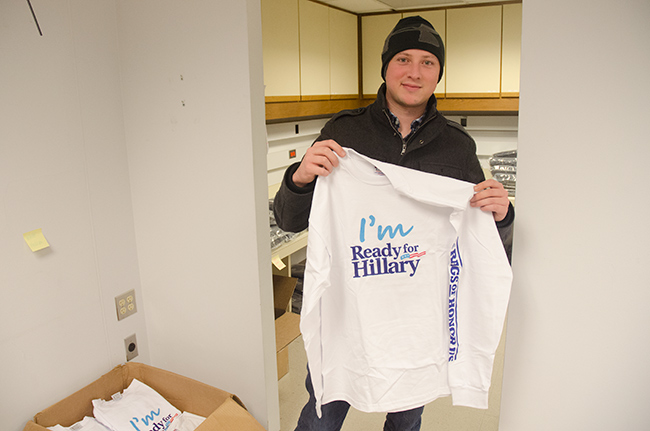- P2016 Home « Declared
2016
Presidential
Candidate « Former Secretary of State Hillary
Clinton
| timeline | Kaine C-SPAN organization-general organization-primary travels |
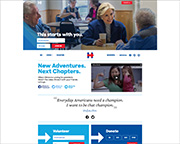 |
 |
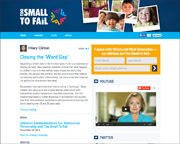 |
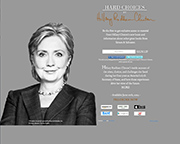
|
|
| magazine
covers early states to 2ndQ 15 |
www.hillaryclinton.com Hillary for America hillaryclinton | @HillaryClinton |
www.clintonfoundation.org/... Clinton Foundation ClintonFoundation | @ClintonFdn |
toosmall.org Too Small To Fail 2smalltofail | @2SmalltoFail |
www.hillaryclintonmemoir.com Hard Choices |
|
| Democracy in Action 2008 campaign |
|||||
| Supporters... | |||||
 |
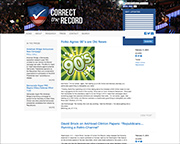 |
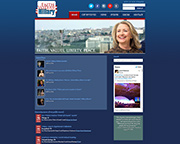 |
|||
| still4hill.com Still4Hill |
www.correcttherecord2016.org American Bridge 21st Century PAC CorrectRecord | @CorrectRecord |
www.faithvotersforhillary.com Faith Voters for Hillary FaithVotersForHillary | @faith4hillary |
|||
| swh2016.com Stand with Hillary PAC (+) standwithhillary | @swh2016 |
www.collegesforhillary.com Colleges for Hillary (+) CollegesForHillary | @CollegesForHRC |
||||
| Opponents... |
|||||
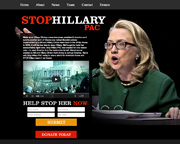 |
 |
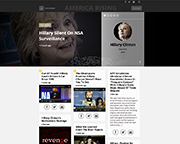 |
|||
| www.stophillarypac.org Stop Hillary PAC StopHillaryPAC | @StopHillaryPAC |
thehillaryproject.com The Hillary Project |
America
Rising
PAC
-
Hillary
Clinton |
Conventional Wisdom
Strengths
- Having served as Secretary of State, U.S. Senator, First Lady of the United States and First Lady of Arkansas, Clinton has a breadth of experience encompassing the international, national and state levels.
- The women's vote.
- Establishment support.
Weaknesses
- Polarizing figure to many; critics sure to raise Benghazi, Whitewater, Travelgate as well as the more recent controversies over her email and the Clinton Foundation.
- Prospect of a coronation as the Democratic nominee holds pitfalls; it may be a challenge to make her campaign interesting.
- After two terms of a Democratic administration, the pendulum could be ready to swing towards the Republicans.
- Age; she will celebrate her 69th birthday a few days before Election Day, making her about nine months younger than Reagan when he was elected.
Notes, Coverage and Speeches
- Concession speech at the New Yorker Hotel in New York, NY, Nov. 9, 2016.
- Millennial speech in the Great Court, Mitten Hall at Temple University in Philadelphia, PA, Sept. 19, 2016.
- Alt-Right speech at Red Mountain Building Student Center at Truckee Meadows Community College in Reno, NV, Aug. 25, 2016.
- Acceptance speech at the Democratic National Convention at Wells Fargo Center in Philadelphia, PA, July 28, 2016.
- Introducing Sen. Tim Kaine as her running mate at Florida International University Arena in Miami, FL, July 23, 2016.
- Speech following Orlando mass shooting at Industrial Innovation Center in Cleveland, OH, June 13, 2016.
- Election night speech at Brooklyn Navy Yard in Brooklyn, NY, June 7, 2016.
- Speech on national security at The Prado at Balboa Park Ballroom in San Diego, CA, June 2, 2016.
- Election night speech following primaries in CT, DE, MD, PA and RI in Philadelphia, PA, April 26, 2016.
- Speech on climate change at DART Central Station in Des Moines, IA, July 27, 2015.
- Speech on encouraging long-term growth at New York University in New York, NY, July 24, 2015.
- Speech on the economy at The New School in New York, NY, July 13, 2015.
- Speech on universal preschool at the YMCA in Rochester, NH, June 15, 2015.
- Launch speech at Four Freedoms Park on Roosevelt Island, New York, NY, June 13, 2015.
- Speech on reforming criminal justice at Columbia University, New York, NY, April 29, 2015.
2016
THE SHOCKING END
On election eve the expectation among most pundits was that Clinton would win, although talk of a blowout win had faded following FBI Director Comey's letter. The Clinton campaign played up early voting results and predicted record turnout would benefit their candidate (+). The Latino vote in particular was seen as a key to her success. On election night Clinton supporters gathered at the Javits Center. Although the campaign had backed away from a planned fireworks display, staff and supporters expected a joyous, celebratory evening. Instead, as state after state was called by news organizations, a growing sense of disbelief and shock filled the Center. Clinton's path to 270 electoral votes narrowed, until finally calls in Pennsylvania and Wisconsin gave the race to Trump. Around 2 a.m. Clinton campaign chairman Tony Podesta came out on the stage at the Javits Center and told deflated Clinton supporters that the campaign would wait until every vote was counted. Clinton did not appear, but around 2:30 a.m. she called Trump to concede. The next morning she delivered her concession speech to a smaller group of staff and supporters in the ballroom of the New Yorker Hotel (+). Analysts began sorting out how the election "got away" (+). Over the next several weeks as more votes were tallied, Clinton's margin over Trump grew to 2.2 million votes, but that could not change the electoral vote tally nor erase the sting felt by Clinton supporters.
CLOSING ARGUMENT
The Clinton campaign presented the election as a choice between, "Donald Trump’s dark and divisive vision that could tear our country apart, and Hillary Clinton’s hopeful, inclusive vision that says we’re stronger together (+)." Further, it argued, "Donald Trump has proven himself again and again to be temperamentally unfit and totally unqualified to be President and Commander-in-Chief." To some extent the campaign went the easy or safe route by putting so much emphasis on denouncing Trump, rather than leading with its policy priorities.
The campaign devoted some of its resources and energy to helping with overall Democratic efforts to win back the Senate, pick up House seats, and compete in some state races by making "unprecedented" investments in the coordinated campaign through the Hillary Victory Fund (+). The DNC was also fully engaged (+), and the pro-Clinton super PAC Priorities USA Action continued to hammer away at Trump in its advertisements (+).
In campaigns there is always the possibilty of an "October surprise," that is a potentially damaging story which emerges right at the end. FBI Director James Comey's Oct. 28 letter on newly discovered Clinton emails reintroduced that unwelcome issue into the discussion. The campaign pushed back forcefully (+), but the story did give a boost to Trump. What had looked like a possibly blowout before the Comey announcement seemed nerve-wrackingly close in the final days. The FBI worked around the clock to review relevant emails, and on Nov. 6 Comey sent another letter to key members of Congress stating that, "Based on our review, we have not changed our conclusions that we expressed in July with respect to Secretary Clinton (+)."
In the closing weeks of the campaign pundits were already discussing what kind of mandate Clinton would have if she were elected. Would the expected outcome be seen as a rejection of Trump as a completely unsuitable candidate or approval of Clinton and her policies? Additionally, the Trump supporters who wanted to "lock her up" and Trump's talk of a possible constitutional crisis might make governing a very difficult task. Much woud depend on the balance in Congress. Clinton's transition team, at work since August (+), had no doubt been preparing for various possibilities.
THE GENERAL ELECTION
The revelation by the Washington Post on Oct. 7 of lewd comments made by Trump in 2005, and subsequent allegations of groping lead many to believe this will be a blowout election. The women's vote alone should give a huge boost Clinton (+). Clinton is receiving help from President Obama (+), First Lady Michelle Obama (+) and Vice President Biden (1, 2), who are making appearances on her behalf and from a large number of surrogates ranging from her husband Bill (+) and daughter Chelsea (+) to Kaine's wife Ann Holton to an assortment of actors and others. Nothing close to that is happening on the Republican side. Clinton is also doing extremely well in newspaper endorsements, even gaining support from papers that have long supported Republican nominees including the Arizona Republic, Cincinnati Enquirer and the Dallas Morning News (1, 2).
Despite Clinton's apparently solid position, there were a couple of clouds in the picture as the campaign entered the closing weeks: the never-ending saga of Clinton's emails (+) and the WikiLeaks releases of thousands of emails from Clinton campaign chairman John Podesta (1, 2). Clinton senior national spokesman Glen Caplin compared the WikiLeaks emails to the Watergate scandal, writing on Oct. 15, "Four decades later, we're witnessing another effort to steal private campaign documents in order to influence an election. Only this time, instead of filing cabinets, it's people's emails they're breaking into...and a foreign government is behind it." The involvement of the Russian government is very troubling and led to reports that the CIA could launch a cyber attack against Russia. Meanwhile, the WikiLeaks emails provided fodder for Trump campaign attacks.
Expectations were high for Clinton going into the first debate. In the policy realm she could run circles around Trump, but she needed avoid coming across as pedantic, lecturing or condescending (see Al Gore). Most observers opined that Clinton had won. Trump was not as prepared as Clinton, missed some opportunities, and delivered some wandering responses. At one point Clinton noted, "I think Donald just criticized me for preparing for this debate. And, yes, I did. And you know what else I prepared for? I prepared to be president. And I think that’s a good thing." In the second debate, Clinton delivered a solid if not overwhelming performance.
In the weeks following the conventions Clinton appeared in a very strong position. Trump's bombast, temperament and his business record proved to be ready targets for the Democrats. Starting in May and June the campaign and its major ally Priorities USA Action ran two months of advertising virtually unanswered by the Trump camp, painting Trump as a dangerous figure, unfit to be president. A steady trickle of Republicans came forth saying they could not support Trump (+). The Clinton campaign's ground game appeared far superior to that of the Trump campaign. On the trail Clinton and Kaine espoused the theme of "stronger together." Clinton advocated a 100 day jobs plan, pledging "to make the biggest investment in new, good-paying jobs since World War II." With three months to go until Election Day, quite a few commentators forsaw a blowout win for the Democratic ticket.
However by mid-Sept. polls tightened and Democrats were starting to get nervous. Republicans continued to make the case that a Clinton presidency would have "disastrous effects (+)" and continued to raise questions about Clinton's emails (+) and the Clinton Foundation (+). September brought a couple of bumps for the Clinton campaign. Clinton's coughing episode in Cleveland on Sept. 5 and her wobbly departure from the 9/11 memorial service in New York put into sharp focus the question of her health, something that Trump and his allies had been raising for months but that the campaign and most in the media had dismissed. Her doctor diagnosed pneumonia on Sept. 9. That very evening at a big LGBT fundraiser in New York, Clinton made a classic gaffe, stating, "To just be grossly generalistic, you can put half of Trump supporters into what I call the basket of deplorables (+)." Clinton also appeared to be having trouble gaining support of millennials. And to top it off, the Clinton-Kaine election tome Stronger Together: A Blueprint for America's Future (Simon & Schuster, Sept. 6) was a flop, selling poorly and described by a Washington Post reviewer as "an embarrassment, sloppy, repetitive, dutiful and boring."
TO THE CONVENTON
It wasn't exactly a coronation, but Hillary Clinton's path to the Democratic nomination proceeded on a seeming inexorable course (1, 2, 3, 4) that led to her becoming the presumptive nominee in early June (+) on track to being the first female nominee for president of a major party. The Associated Press reported on June 6 that Cinton had sufficient delegates to win the nomination, Clinton's wins on June 7 made the point clearer, and President Obama's endorsement on June 9 put a seal on the moment (+). The stage is set for a general election campaign in whilch voters can, in Obama's words, "build on the progress that we’ve made" or in the view of Republicans "give President Obama’s failed polices a third term."
From the outset Clinton held a huge lead in endorsements by the unpledged superdelegates, and those votes count equally. Clinton won numerous endorsements among organized labor and other Democratic leaning organizations (+) as well as from editorial boards (+). The campaign's fundraising was solid (+).
Yet Sen. Bernie Sanders proved a surprisingly resilient challenger. After a virtual tie in Iowa and a drubbing in New Hampshire, Clinton prevailed in Nevada, trounced Sanders in South Carolina, and had a strong showing on Super Tuesday, particularly in the South (+). There were setbacks, including the Michigan primary on March 8, the Washington, Alaska and Hawaii contests on March 26, and the April 5 primary in Wisconsin, but Clinton rebounded with a double-digit win on April 19 in her home state of New York, wins in four of the five Apirl 26 contests in Northeastern states, and a strong finish on June 7.
Clinton set a theme that hers is "a campaign to break down every barrier that holds you back." On the policy front, she has rolled out numerous initiatives. For example, on Dec. 22 she announced a plan to invest $2 billion per year for research on Alzheimer's and releated disorders (+). On Jan. 11 she announced a "Fair Share Surcharge" on multi-millionaires (+). On March 4 she announced a "clawback" proposal to "rescind tax relief and other incentives for corporations if they move overseas any jobs, facilities or production (+)." On May 10 in Kentucky Clinton anounced she would significantly increase child care investments so no family pays more than 10 percent of their income for child care (+). The proliferation of proposals contrasted with a more broad-brush approach taken by Sen. Sanders. Clinton sought to differentiate herself from Sanders in a number of ways, for example by highlighting his positions on guns (+). More broadly, as her Arkansas press secretary Mary Rutherford Jennings stated, “In contrast to Senator Sanders, Hillary Clinton doesn’t make big campaign promises she can’t keep or propose plans that don’t add up." Indeed, the Committee for a Responsible Federal Budget estimated that, "Secretary Clinton’s proposals would cost $1.8 trillion over a decade with interest, and they would be nearly fully paid for with $1.6 trillion of offsets." The Center commended Clinton for that commitment but stated "with debt at post-war record high levels and projected to grow unsustainably, simply remaining on our current course is not enough (>)."
By late April to early May Clinton started to turn her attention to presumptive GOP nominee Donald Trump, and her campaign began building its general election organization, naming state directors in battleground states. Yet despite the delegate math, Sen. Sanders persisted, carrying his challenge right through to the end of the primary season and even talking about the possibility of a "messy convention." Clinton continued to consolidate support (1, 2). Sanders meanwhile gained a significant say in drafting the platform (+), signs of a rapprochement were evident (+) and it appears that he will endorse Clinton in Portsmouth, NH on July 12.
Clinton has put also a couple of significant challenges behind her as much as possible. On June 28 the Select Committee on Benghazi issued its report, which contained no bombshell revelations and did not blame Clinton for that tragedy (+). Then there was the matter of Clinton's emails which produced a drip-drip-drip of stories for about 16 months (1, 2, 3) and led some critics to speculate that Clinton might be indicted. Clinton did a voluntary interview on the emails at FBI headquarters on July 2. On July 5 FBI Director James B. Comey stated that Clinton and her colleagues had been "extremely careless in their handling of very sensitive, highly classified information," but Comey stated, "we cannot find a case that would support bringing criminal charges on these facts (+)." Although the findings were sharply critical, for Clinton it amounted to somewhat of a vindication (+). Clinton critics will not let up and the issue is not likely disappear. Donald Trump continues to use the "Crooked Hillary" label (+), and more books and films critical of Clinton are scheduled for release (+). Critics and some in the media have also noted that it is more than 200 days since Clinton last held a formal news conference, on Dec. 4, 2015.
Clinton conducted her vice presidential selection process, headed by campaign chairman John Podesta assisted by Cheryl Mills in secrecy. Many names figured in media speculation including Sen. Elizabeth Warren (MA), Sen. Cory Booker (NJ), Sen. Sherrod Brown (OH), Sen Tim Kaine (VA), Agriculture Secretary Tom Vilsack, Labor Secretary Tom Perez, HUD Secretary Julian Castro, Rep. Xavex Becerra (CA), and even at one point retired Admiral James G. Stavridis. Most speculation focused on Kaine, who was seen as a safe pick as he had already been vetted by Obama in 2008.. Clinton introduced Kaine as her running mate at a rally in Miami on July 23.
2015 - In the first months of 2015 Clinton kept a low profile (+), while the outlines of a likely campaign began to take shape (+). For example, in a Feb. 6 article in The Washington Post, veteran political correspondents Anne Gearan and Dan Balz described "a massive 2016 team-in-waiting." Subsequently there was a steady trickle of reports about staff signings (+). An underlying theme was "avoiding the mistakes of the 2008." The Post also reported on a rebranding effort. After reports earlier in the year that she might put off a launch until as late as July, the campaign gravitated to launch in April. MSNBC reported that Clinton's last paid speech was to occur on March 19. On April 3 Politico reported that the Clinton team had signed a lease and was setting up shop at 1 Pierrepont Plaza in Brooklyn Heights, occupying two floors of the building. The independent Ready for Hillary continued its work up to Clinton's announcement, and some RfH staff moved over to the campaign. Hillary critics continued their preparations as well. RNC chairman Reince Priebus, in his re-election speech at the RNC winter meeting, stated, "We’ve been preparing for a long, long time, and we’re Ready for Hillary (+)."
On the afternoon of April 12, Hillary Clinton's much anticipated announcement came, as the Hillary for America website went live. Her message, via video, "Everyday Americans need a champion. And I want to be that champion (+)." The campaign started out with a very large staff from day one (+), but it sought to convey the notion of humble, small-scale beginnings. Rather than boarding a customized bus and holding a series of large rallies, Clinton set out on a road trip; she and a few staffers loaded a van and headed off from New York to Iowa. There she did a couple of roundtables as well as private meetings with small groups of seven or eight people. At a roundtable in Monticello, Iowa Clinton outlined "four big fights" that will be at the center of her campaign: "building the economy of tomorrow, strengthening families and communities, fixing our dysfunctional political system, and protecting America from threats (+)." Field organizers are circulating "commit to caucus" cards and signing up volunteers, and similar activity is occuring in the other early states. On April 22 the campaign launched a "Ramp Up Grassroots Organizing Program" to recruit and train volunteers in all 50 states, DC and the territories. Clinton also is receiving help from indpendent groups; in May, Correct the Record, formerly a part of American Bridge 21st Century, spun off as a separate super PAC; its mission is "to defend Clinton from right-wing baseless attacks (+).
Two months after her soft rollout via video, former Secretary of State Hillary Clinton officially launched her campaign with a major speech at the Franklin D. Roosevelt Four Freedoms Park in New York City on June 13 (1, 2).
On the policy front, Clinton has worked to win over progressives. On April 29 at Columbia University, she delivered her first policy speech of the campaign, speaking on reforming criminal justice (+). On May 5 in Las Vegas, speaking on immigration reform, she called for "a path to full and equal citizenship (+)." She has also addressed climate change (+), on Aug. 10 she announced a "New College Compact" to address rising college costs and student debt (+), and on Sept. 8 she announced proposals on campaign finance reform (+). On Sept. 22 in response to a question at a community forum in Des Moines, Clinton came out against the Keystone XL pipeline. In an interview on Oct. 7 she broke with the Obama Administration and came out against the Trans Pacific Partnership.
A July 2015 memo (from Wikileaks in Fall 2016) set out five "strategic imperatives": win Iowa and New Hampshire, build a March firewall in Super Tuesday states, build a strong digital community, build a super delegate firewall, and "cast HRC as a tenacious fighter who will get things done for everyday Americans [PDF]." In an Aug. 2015 memo, Clinton campaign manager Robbie Mook reported that, "Hillary Clinton stands in a very strong position to win the Democratic primary and the general election (+)." Republicans, meanwhile, portrayed Clinton as a candidate "on the ropes (+)." The Clinton campaign put a lot of resources into building organizations in the early states (+). Clinton's major competition in the primary campaign came from Sen. Bernie Sanders (I-VT), who is drew large crowds and was building a significant campaign organization, although still much smaller than Clinton's. Gov. Martin O'Malley sought to emphasize a progressive policy agenda, but did not seem to attract much support. Former Sen. Lincoln Chafee and former Sen. Jim Webb had scant organization. Vice President Joe Biden remained a wild card. Meanwhile the Clinton fundraising machine rolled along; CNN reported that she did 58 fundraisers in the second quarter and another 58 in the third quarter (>).
There were some red flags, however; a spate of developments in the first part of 2015 proved very unsettling for Clinton supporters and Democrats. The Select Committee on Benghazi started its work in January (+). On March 2 the New York Times' Michael S. Schmidt reported that Clinton "exclusively used a personal email account to conduct government business as secretary of state (+)." This story made a lot of news and continued to reverberate for months (+, >). On August 11 news broke that Clinton would turn over her server to the Department of Justice (+). The Select Committee on Benghazi focused considerable attention on the emails (+). Clinton's allies have pointed out that other political figures including Gov. Jeb Bush have been less than transparent in their email practices, but what is at stake is people's perceptions of Clinton's trustworthiness. By the end of September the Benghazi Committee had achieved the distinction of being one of and perhaps the longest congressional investigations in history (+)
Questions over fundraising and spending at the Clinton Foundation and over contributions from foreign governments also gained a bit of traction (+). Reuters reported on April 23 that after its review of the Foundation's 990 forms found errors, the Foundation was to refile its tax returns for several years. Additionally, Clinton's relationship with the media has at times been problematic, and that showed signs of continuing (+).
In view of all the flack, there was a bit of unease, worry among some Democrats about Clinton's prospects and even whether the campaign might implode. The unease was one of the major impetuses behind the effort to draft Biden into the race.
October proved to be a good month for Clinton in clearing away some of the doubts. Her performance in the first debate, held October 13 in Las Vegas, was widely praised. On October 21, Vice President Joe Biden announced he would not run (+). On October 22 Clinton testified before the Benghazi Committee (+). By November Clinton's nomination appeared all but inevitable. Although Sen. Bernie Sanders and former Gov. Martin O'Malley continued to run vigorous campaigns, Clinton was locking up support from elected officials and superdelegates at a rapid rate (+) in addition to gaining support of many major unions (+).
The Democratic National Convention in Philadelphia provided some interesting moments, including DNC chair Debbie Wasserman Schultz' announcement on July 24 that she would resign following release of hacked DNC emails, and boisterous unrest by some Sanders supporters in the hall during the first several days. Some Sanders delegates and activists vowed that they would never support Clinton. Other Sanders delegates acceded to the calls for unity, and donned Clinton campaign buttons or shirts. Personal interactions within state delegations, as well as powerful speeches by Michelle Obama, Vice President Biden, President Obama and others helped pave the way. Closing speeches by Chelsea Clinton and Hillary Clinton brought the Convention to a successful close, and Clinton and Kaine started a bus tour the next day.
2014 - In the first part of the year Hillary Clinton maintained a busy schedule of speeches and activities, while keeping a relatively low profile. The release of her memoir Hard Choices on June 10 and her book tour set off an intense burst of media attention (+). Grandbaby watch also received a lot of coverage. On April 17 Clinton tweeted - "My most exciting title yet: Grandmother-To-Be! @billclinton and I are thrilled that Chelsea and Marc are expecting their first child!" Granddaughter Charlotte was born on Sept. 26. In September Clinton started to step up her political activity, most visibly with the Harkin Steak Fry in Indianola, Iowa on Sept. 14, where both she and Bill spoke. Heading into the Nov. 4 elections, both Hillary Clinton and Bill Clinton have been top Democratic stars on the stump, headlining rallies for candidates around the country (+).
Independent activity both for and against Clinton has continued. In the year since its launch on April 2, 2013 the Ready for Hillary super PAC reported that it has identified more than two million supporters of Hillary Clinton, including more than 700,000 who have signed a pledge to help if she runs as well as several dozen elected officials (+); further the super PAC has raised more than $10.25 million. Also aligning to support a possible Clinton bid are Priorities USA Action (1, 2) and Correct the Record (+). Opponents are not standing still. America Rising PAC, "an organization on the right for which the sole purpose is to expose the truth about Democrats through video tracking, research, and communications," is posting a steady stream of critical articles. The RNC weighs in from time to time (1, 2).
In Jan. 2014 Stop Hillary PAC filed an FEC complaint [PDF] against Ready for Hillary PAC et al..
2013 - The year got off to a difficult start for Sec. Clinton. The effects of a Dec. 13, 2012 fall and concussion followed by a blot clot lingered for months. On Jan. 23, 2013, the then Secretary of State testified before the Senate Foreign Relations Committee and the House Foreign Affairs Committee about the Sept. 11, 2012 terrorist attacks in Benghazi. Since finishing her tenure at the Department of State on Feb. 1, Clinton has kept a fairly busy schedule. She found a landing place at The Clinton Foundation, renamed in March as the Bill, Hillary and Chelsea Clinton Foundation. She has received various honors and awards and given a bunch of speeches, some to trade associations and businesses for a speaking fee reported at around $200,000 per speech and others to favored causes or to raise money for the Clinton Foundation. She also has ventured out onto the campaign trail, stumping with Virginia gubernatorial candidate and friend Terry McAuliffe in Falls Church on Oct. 19 and appearing at a fundraiser for NYC mayoral candidate Bill de Blasio, who managed her 2000 U.S. Senate campaign, at the Roosevelt Hotel on Oct. 21. On June 10 Clinton launched a Twitter account ("Wife, mom, lawyer, women & kids advocate, FLOAR, FLOTUS, US Senator, SecState, author, dog owner, hair icon, pantsuit aficionado, glass ceiling cracker, TBD...") On June 14 she announced she is partnering with Next Generation in the Too Small to Fail early childhood initiative. As part of her work at the Clinton Foundation, on Nov. 1 she launched No Ceilings: The Full Participation Project.
In late July 2013 NBC announced it was in the early development on a four-hour miniseries on Hillary Clinton and CNN announced it had commissioned a feature length documentary on Hillary Clinton. The projects were sharply criticized by the RNC and met with resistance from the Clinton camp (>), and by September both were cancelled (+).
Clinton appears poised for a run, and conventional wisdom at this early, pre-campaign stage is that she would be the almost-certain nominee if she does run. For example, in October, speaking at an EMILY's List event in New York, Sen. Kay Hagan let slip the existence of a secret letter circulated by Sen. Barbara Boxer in the first part of the year in which all 16 Democratic women senators urged Clinton to run. In May, EMILY's List launched Madame President, a "national campaign to put a woman in the White House." (The effort does not specifically back Hillary Clinton, but clearly they don't have Sarah Palin in mind). The independent Ready for Hillary super PAC is building "a grassroots army" of supporters that could prove very helpful. Certainly the RNC is keeping a close eye on the Hillaryosphere (>).
Readings
 |
 |
 |
 |
 |
 |
 |
 |
 |
 |
Hillary Rodham Clinton and Tim Kaine. Sept. 6, 2016. STRONGER TOGETHER: A Blueprint for America's Future. New York: Simon & Schuster.
"For more than a year, Hillary Clinton has laid out an ambitious agenda to improve the lives of the American people and make our country stronger and safer. Stronger Together presents that agenda in full, relating stories from the American people and outlining the Clinton/Kaine campaign’s plans on everything from apprenticeships to the Zika virus..."
Gary J. Byrne. June 28, 2016. CRISIS OF CHARACTER: A White House Secret Service Officer Discloses His Firsthand Experience with Hillary, Bill, and How They Operate. New York: Hachette Book Group.
"Having witnessed the personal and political dysfunction of the Clinton White House--so consumed by scandal and destroying their enemies, real and imagined--Byrne came to understand that, to the Clintons, governing was an afterthought. He now tells this story--before voters go to the polls--in the hopes that Clinton supporters will understand the real Hillary Clinton."
response +
Liza Featherstone, ed. May 17, 2016. FALSE CHOICES: The Faux Feminism of Hillary Rodham Clinton. New York: Verso [Penguin Random House]
"In the run-up to the 2016 presidential election, the mantle of feminist elect has descended on Hillary Clinton, as a thousand viral memes applaud her, and most mainstream feminist leaders, thinkers, and organizations endorse her... In False Choices, an all-star lineup of feminists contests this simplistic reading of the candidate. A detailed look at Hillary Clinton’s track record on welfare, Wall Street, criminal justice, education, and war reveals that she has advanced laws and policies that have done real harm to the lives of women and children across the country and the globe. This well-researched collection of essays restores to feminism its revolutionary meaning, and outlines how it could transform the United States and its relation to the world."
Mark Landler. April 25, 2016. ALTER EGOS: Hillary Clinton, Barack Obama, and the Twilight Struggle Over American Power. New York: Random House.
"The deeply reported story of two supremely ambitious figures, Barack Obama and Hillary Clinton—archrivals who became partners for a time, trailblazers who share a common sense of their historic destiny but hold very different beliefs about how to project American power. In Alter Egos, veteran New York Times White House correspondent Mark Landler takes us inside the fraught and fascinating relationship between Barack Obama and Hillary Clinton—a relationship that has framed the nation’s great debates over war and peace for the past eight years."
Richard Kreitner, ed. Jan. 30, 2016. WHO IS HILLARY CLINTON? Two Decades of Answers from the Left. London, UK: I.B. Tauris & Co Ltd.
"Who is Hillary Clinton? is a fascinating time-lapse depiction of the leading Democratic presidential candidate as seen from the left. But it is also much more than that. A carefully-edited anthology of The Nation's coverage of Clinton's career, it's a rigorous and painstaking study of one of our most enigmatic public figures. It is a history of our time, and a must-read for the 2016 election season, providing perspective on the woman who could become the first female President of the United States."
Edward Klein. Sept. 28, 2015. UNLIKEABLE: The Problem with Hillary. Washington, DC: Regnery Publishing.
"Unlikeable is the stunning, powerful exposé of Hillary Clinton and her floundering race for the White House. With unprecedented access to longtime associates of the Clintons and the Obamas, investigative reporter Edward Klein meticulously recreates conversations and details of Hillary Clinton’s behind-the-scenes plotting in Chappaqua and Whitehaven. Klein, the former editor in chief of New York Times Magazine and a contributing editor to Vanity Fair, draws a deeply troubling portrait of Hillary Rodham Clinton, a highly unlikeable presidential candidate and a woman more associated with scandal than with accomplishments, with lying than with truth, with arrogance than with compassion."
response +
Peter Schweizer. May 5, 2015. CLINTON CASH: The Untold Story of How and Why Foreign Governments and Businesses Helped Make Bill and Hillary Rich. New York: Harper.
"In the New York Times bestseller Clinton Cash, he follows the Clinton money trail, revealing the connection between their personal fortune, their “close personal friends,” the Clinton Foundation, foreign nations, and some of the highest ranks of government. Now, with Hillary on the verge of winning the presidential nomination, the questions it raises are more important than ever."
responses 1; 2. 3 [PDF]
Daniel Halper. July 22, 2014. CLINTON, INC.: The Audacious Rebuilding of a Political Machine. New York: Broadside Books [Harper Collins].
"Weekly Standard editor Daniel Halper provides a meticulously researched account of the brilliant calculations, secret deals, and occasionally treacherous maneuverings that led to the Clintons’ return to political prominence."
Hillary Clinton. June 10, 2014. HARD CHOICES. New York: Simon & Schuster.
"Drawing on conversations with numerous leaders and experts, Secretary Clinton offers her views on what it will take for the United States to compete and thrive in an interdependent world. She makes a passionate case for human rights and the full participation in society of women, youth, and LGBT people. An astute eyewitness to decades of social change, she distinguishes the trendlines from the headlines and describes the progress occurring throughout the world, day after day. Secretary Clinton’s descriptions of diplomatic conversations at the highest levels offer readers a master class in international relations, as does her analysis of how we can best use “smart power” to deliver security and prosperity in a rapidly changing world—one in which America remains the indispensable nation."
Jonathan Allen and Amie Parnes. Feb. 11, 2014. HRC: State Secrets and the Rebirth of Hillary Clinton. New York: Crown [Random House]. >
"The story of Hillary’s phoenixlike rise is at the heart of HRC, a riveting political biography that journeys into the heart of “Hillaryland” to discover a brilliant strategist at work. Masterfully unfolded by Politico’s Jonathan Allen and The Hill’s Amie Parnes from more than two hundred top-access interviews with Hillary’s intimates, colleagues, supporters, and enemies, HRC portrays a seasoned operator who negotiates political and diplomatic worlds with equal savvy."
Early Articles
Philip Rucker and Anne Gearan. "The making of Hillary 5.0: Marketing wizards help re-imagine Clinton brand." The Washington Post. Feb. 21, 2015.
Peter Beinart. "A Unified Theory of Hillary." National Journal. June 18, 2014.
Ken Auletta. "The Hillary Show." The New Yorker. June 2, 2014.
Glenn Thrush and Maggie Haberman. "What Is Hillary Clinton Afraid Of?" Politico. May/June 2014.
Amy Chozick. "Planet Hillary." The New York Times Magazine. Jan. 24, 2014.
Maggie Haberman. "Hillary Clinton's shadow camapign." Politico, Jan. 5, 2014.
Joe Hagan. "Hillary in Midair." New York. Sept. 22, 2013.
Archive
Ready for Hillary, a super PAC formed in Jan. 2013, was very active through to the lauch of Clinton's campaign, identifying some 4 million supporters.
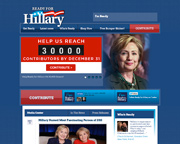
www.readyforhillary.com
Ready for Hillary super PAC
ReadyForHillary | @ReadyforHillary
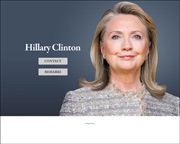 |
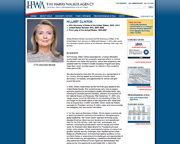 |
|||
| hillaryclintonoffice.com Office of Hillary Clinton |
www.harrywalker.com/... Hillary Clinton page at The Harry Walker Agency |
Cautionary Note to Readers from Early 2015 - Conventional wisdom says that Hillary Clinton is likely, some would say all-but-certain, to be the Democratic nominee. However, there is a saying that the only certainty in politics is that nothing is certain. The prospect of a coronation scenario or of Hillary Clinton as the inevitable nominee is unlikely to occur. Clinton held the position of the heavyweight in the 2008 campaign for the Democratic nomination, only to see then Sen. Obama prevail in a closely fought contest. She starts out with significant advantages in establishment backing, fundraising and name ID. Yet Clinton remains a polarizing figure, evidenced by efforts such as the Stop Hillary PAC, The Hillary Project, and America Rising PAC's StopHillary2016.org. In particular critics continue to raise questions about Benghazi, and her handling of emails from her time Secretary of State raised an additional set of questions. Clinton's rocky relationship with the media could also prove problematic. She is not known as the best campaigner, and simply meeting expectations and keeping people engaged and interested throughout 2015 and the primaries will be a challenge. Finally, Clinton will be pressured from the left; for example more progressive elements in the Democratic Party are calling for a campaign of "bold populist economic ideas (+).
this page last revised
November 26, 2016
ADVERTISEMENT

